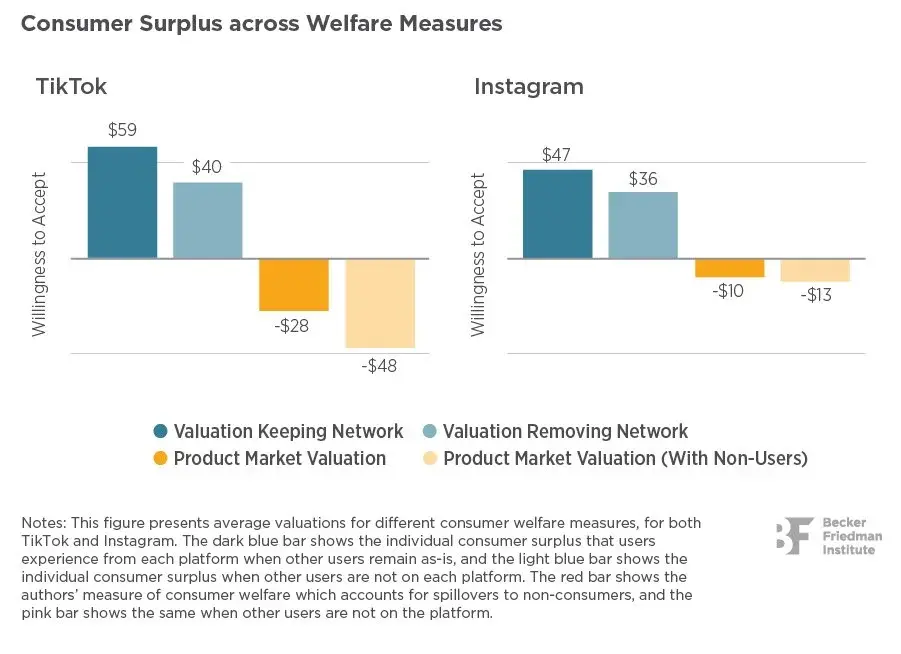Those findings are crazy. I’ve never been social media addicted, been into luxury or general show-off brands (I pay extra to not look like I’m an advertisement… for anything but metal bands), so I don’t really know much about those issues.
This is applicable to any number of things. Those of us who are into computer games would mostly like companies to release them in a finished state but are pretty helpless against abusive marketing and peer pressure. Our friends in gaming are also a network.
The important takeaway here for me is that we meed to abplish the idea of „voting with your wallet“ since this mechanic is broken in the presence of networking effects. E.g. you not only miss out on the game/app/product but you hurt your network and become more isolated.
deleted by creator
I don’t play a lot of multiplayers games either but thats not the only point.
-
if you play a mp game regularly, you make friends and build up community. If the product changes for the worse, you‘re pitting your financial self interest against you community. Btw. that is how relationships work for a lot of neurodivergent people. IRL we face significant challenges which used to be no problem until companies started enshittifying.
-
Aside from multiplayer, if you have offline friends, games are like brands or social media tools. You need to play the games (at least some) your peers play so that you can bond with them. Otherwise you become irrelevant. If they play fames with harmful gambling mechanics (lootboxes for example) you are introduced to and kept in that ecosphere.
Now we need to address that vote with your wallet only works if you’re sufficiently able (mentally, educationally) to swim against the tide and you can see how this is like telling people in wheelchairs to just get up a couple stairs already. (Since a lot of us actually don’t have the selfimage to maintain behavior like this)
deleted by creator
Why is that important? It is a significant amount of people. Add up children (who are prone to be peer pressured), the neurodivergent (who are in need of alternative ways to socialize) and those who are not strong of will.
Additionally, it does not have to be a strong tide. Like with dark patterns, it just needs to make it „sufficiently hard“ to switch the vendor and you constitute a lock in (which we are discussing rn).
Edit: imagine we would ask this question when assessing a wheelchair ramp at a mall? It is not important if it’s the majority but if people suffer under this when it is (easily) preventable.
deleted by creator
You were faster to answer than my edit.
I can only asssume why the technique hasn’t worked for a long time. But taking the example from social media where it would be voting with your feet (leaving), the product markets for games are defined. And in these markets, I recon the majority is vulnerable, so yes. It is most likely the majority.
deleted by creator
-
You don’t. I play lots of multiplayer games (they’re pretty much all I play these days). You just play different games with different groups of your friends at different times.
I didn’t like Balder’s Gate, RPGs just aren’t my cup of tea. Some of my friends played it, I did things with other friends that interested me.
This person’s argument might apply to some people, but for the majority of people I’ve met, they have more than a couple of friends or at least have friends that are decent enough to say “okay we all like X, so we’ll play that instead since everybody is here.”
Depends on the circles you keep. But if your gaming crew if say 6 people are all playing Overwatch, what’s the game you’re likely playing? It’s not even pressure it’s just how social conformity work.
Isolation is a strong word. But to some degree, it’s about community. If your friends are all playing hockey all summer and in August you dip and spend it playing chess or drawing, it’s not going to strengthen the ties you have. Same deal with gaming. With any socially oriented hobby tbh.
It doesn’t mean you’ll turn into the Uni Bomber tho.
Yeah gotta say this is beyond obvious. My stats prof would be winding up with chalk.
If some guy came up trying to sell me an expensive marine device for boats, I’d keep walking. I’m sure it’s a legit, valuable product, but I don’t have a boat. Nor care to own one. To me, that item has zero worth.
Same applies if Adobe offered me their suite. I don’t use their stuff. Zero interest in it.
To me, this is behind obvious. What good is a site if I don’t care for the service? Moreover, social media is invasive, so no wonder it makes sense that those not interested would find more value were it gone. That annoying song they played incessantly on the radio? Isn’t your life better after it fizzles out? What’s the groundbreaking finding?
The groundbreaking finding is that it is in fact not ok go blame the victim. /s
It is obvious for those without ingrained ableism (who therefore dont blame people for being unable to fight against companies that employ psychologists)
It turns out, when our entire society is built around products, peer pressure to consume becomes a major driving force.
deleted by creator
Yep, this is why my family has been phasing gas using products out of our home. One being the electric stove and water heater. It’s nice to know that some of the electricity is solar now too.
I’ve never understood the whole “fear of missing out” thing, probably because I’ve spent my entire life “missing out” by most people’s standards and am aware that it isn’t the end of the world.
Obviously you missed the announcement that it is, indeed, the end of the world.
🎵 It’s the end of the world as we know it, and I feel fine. 🎵 (Seriously, if I had a nickel for every time someone said or implied that . . .)
This research challenges the standard argument that the mere existence of a product implies positive welfare for its users.
I know this probably means something I don’t understand, but it feels so stupid… Like, what about asbestos?
Separately, to answer your question… It’s generally been assumed I suppose, if a product is invented and people use it, that means it’s providing some positive impact. Like asbestos did initially.
What this research says is that there are products that make the users’ lives worse, and would be even worse than that if they didn’t because their peers are using the products and they would be left out.
Like, the ideal scenario for happiness might be if Tiktok didn’t exist, but since it does it’s now a choice for school aged kids between “using Tiktok and absorbing harmful messages” and “not using Tiktok and feeling left out and possibly being ostracized by their peers”. The very existence of some products cause usage simply because it’s the least bad option of using/not using.
Asbestos is strong, cheap, has great fire insulation, sound insulation, heating insulation, fire protection, and resistant to water. What a wonderful building material! It wasn’t until later that we discovered the health hazards (or, maybe they were known but it only became widely and publicly known later, I’m not sure).
It works very well in my brake system.
I really miss the mid 90’s / early 2k chats and forums. I still occasionally use irc. Back when the most personal info anyone could be reasonably asked for was “asl?”
They’ve turned us into the product and consumer. A snake ever hungry, eating it’s own tail.







